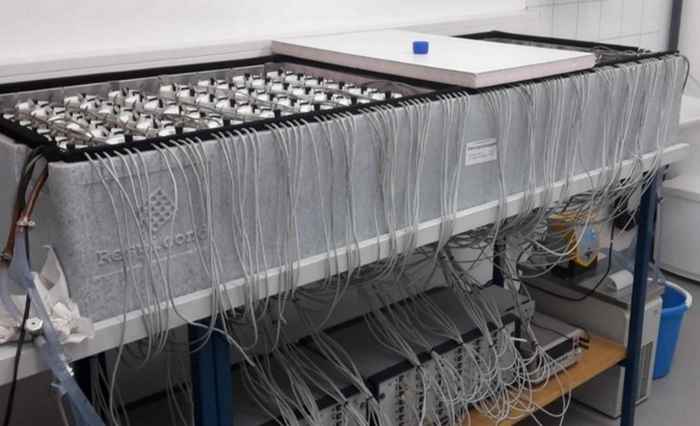RIBIPOL realises significant progress in the development of bio-based polyesters
Novel polymers and insight in degradation as well as consumer attitudes
8 February 2024

Five patents, five PhD’s, more than twenty high-quality scientific publications, promising novel polymers and ongoing cooperations with LEGO and Avantium. These are just a few of the key outcomes of the RIBIPOL project, to the great satisfaction of Gruter, head of the Industrial Sustainable Chemistry group.
“We kicked-off RIBIPOL in 2017, as one of the first projects of our group. The results underscore the relevance of our mission to develop new bio-based sustainable polyesters, focusing on scalable chemistry and potential for large-scale application. We aim not only to lower the carbon dioxide footprint of the chemical industry but also to ‘design’ polyesters that have better performance, better recyclability and in several cases better fate-in-nature.”
New polymerization process
Of the five PhD students in the project (Daniel Weinland, Yue Wang and Maria Zwicker) have already successfully defended their thesis. The other two (Kevin van der Maas and Bruno Bottega Pergher) will graduate later this year. Their research has already been published or accepted in ten scientific peer reviewed papers and according to Gruter at least ten more papers will follow. But it is not so much their number as their content that pleases him. For instance, RIBIPOL has yielded a new polymerization process to produce high molecular weight polyesters from biobased secondary alcohols, such as isosorbide, that are quite rigid but unfortunately hardly reactive.
“This now enables the production of very strong and durable biobased plastics from building blocks that are already commercially available”, says Gruter. The process was published in Nature Communications in 2022 and the paper has already been accessed more than 5500 times in 13 months. Inspired by the new polymerization process the RIBIPOL team also developed a molecular ‘chain extender’. Gruter: “It is so reactive that it allows the production of polyesters without a catalyst. This is very relevant, as catalysts for polymerization processes inherently end up in the product. And as we recently have seen, PET microplastics that typically contain antimony catalysts end up in our bodies via drinking water, food and the air we breathe.”
Home compostable

RIBIPOL was not only about materials development but had a much broader scope. Because if you focus on application you can’t just develop plastics, you have to establish their fate in the environment and assess how society will perceive and use them. So PhD student Yue Wang developed a state-of-the-art fully automated parallel (bio)degradation platform with 96 reactors, to perform degradation research in cooperation with researchers John Parsons and Albert Tietema at the UvA Institute for Biodiversity and Ecosystem Dynamics. “Via the generation of more than 500.000 CO2 measurements we were able to follow degradation of all poly(isosorbide oxalate) copolyesters developed in the project for a period of up to 270 days”, Gruter explains. “Almost all these PISOX copolyesters were shown to be home compostable. The biodegradable polymers developed for LEGO were shown to be stable until their biodegradation - as was the objective.”
Many consumers are confused about the concepts 'bio-based' and 'biodegradable', and what role these features can play in the path to sustainability.
The project has also provided striking insights into the perception of consumers of the novel plastics. Research of PhD student Maria Zwicker at the Social Psychology group (UvA faculty of Social and Behavioural Sciences) established that consumers are willing to pay a premium when products are packaged in sustainable materials - which contradicts many assertions of major brand owners. In particular, consumers are willing to pay more when the sustainable packaging can be recognized as such. “It certainly helps when products can be seen to be green”, says Gruter. “On the other hand, we had to conclude that many consumers are confused about the concepts bio-based and biodegradable and what role these features can play in the path to sustainability. So there’s much work to be done there.” He is thankful that the Domain Science of NWO agreed to fund Zwicker’s research as a PhD student in Social and Behavioural Sciences as integral part of the project. “It has led to a very insightful and inspiring collaboration that we have already extended via a project on textile recycling that is also funded by NWO.”
Industrially relevant
One of the RIBIPOL partners was LEGO, and according to Gruter the toy company is very enthusiastic about one of the polymers developed in the project. “We are happy to continue working with LEGO. As a next step we will scale up the synthesis of this polyester to a scale of tens of kilograms. LEGO will then pursue further application development.” Another polymer developed in RIBIPOL has received specific industrial interest for another application. A new project will start to further develop this material and its foreseen application.

To Gruter, achieving industrially relevant results is key. He not only heads the Industrial Sustainable Chemistry group as a part-time professor; he is also the Chief Technology Officer of Avantium. This Amsterdam company is known for its development of novel chemical technologies, among which the production of the biobased PEF polymer that can replace fossil PET polymers. Avantium was also a partner in RIBIPOL and has acquired the patent rights of the five RIBIPOL patents that were filed, on which the PhD students are co-inventors. Three of them (Weinland, Van der Maas and Bottega Pergher) are now working at Avantium at positions that helps the company to further boost the relevance of the novel polymers.
To Gruter there is no reason why academic research cannot be in part fundamental (understanding the polymerization process), and at the same time very innovative and applied. Looking back, he is very positive about his first academic project: “The ISC group is bridging exciting relevant academic research with industry’s unmet needs. The students that were working on the project made the deliberate choice to work on a project ‘with a purpose’ - and they all delivered!”